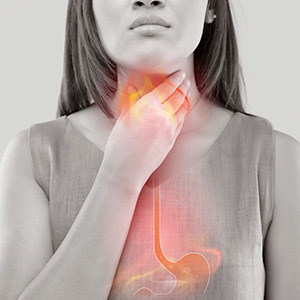
What is GERD?
Gastroesophageal reflux disease (GERD) is a chronic condition where stomach acid frequently flows back into the esophagus, the tube connecting your mouth and stomach. This backflow, or reflux, can irritate the lining of the esophagus, leading to symptoms like heartburn, regurgitation, and discomfort in the chest. Over time, untreated GERD can lead to more serious health problems, such as esophagitis, Barrett's esophagus, or even esophageal cancer.
Common Causes of GERD
Weak Lower Esophageal Sphincter (LES)
The lower esophageal sphincter (LES) is a ring of muscle that acts as a valve between the esophagus and the stomach. Normally, the LES opens to allow food into the stomach and closes to prevent stomach contents from flowing back up. In people with GERD, the LES may be weak or relax inappropriately, allowing acid to escape from the stomach into the esophagus. This malfunction is a primary cause of GERD.
Dietary and Lifestyle Factors
Certain foods and habits can trigger or worsen GERD. Consuming large meals or lying down immediately after eating can increase the likelihood of reflux. Foods and beverages like fatty or fried foods, chocolate, caffeine, alcohol, and carbonated drinks can relax the LES or increase stomach acid production, leading to symptoms. Smoking and obesity are also significant risk factors, as they can weaken the LES and increase abdominal pressure, respectively.
Hiatal Hernia
A hiatal hernia occurs when the upper part of the stomach pushes through the diaphragm into the chest cavity. This condition can weaken the LES, making it easier for acid to reflux into the esophagus. Hiatal hernias are a common cause of GERD, especially in older adults.
Pregnancy
Pregnancy can contribute to GERD due to hormonal changes and increased pressure on the stomach from the growing uterus. Many women experience GERD symptoms during pregnancy, particularly in the third trimester. While these symptoms often resolve after childbirth, managing GERD during pregnancy is important for comfort and health.
Medications
Certain medications can increase the risk of GERD by relaxing the LES or irritating the esophagus. These include anti-inflammatory drugs, muscle relaxants, and some blood pressure medications. If you take these medications and experience GERD symptoms, it’s important to discuss alternative treatments with your healthcare provider.
Preventing GERD
Dietary Changes
One of the most effective ways to prevent GERD is by making dietary adjustments. Avoiding trigger foods like spicy dishes, fatty meals, chocolate, and caffeine can help reduce symptoms. Eating smaller, more frequent meals rather than large ones can also prevent the stomach from becoming too full, which can lead to reflux. Incorporating more fruits, vegetables, and whole grains into your diet can promote digestive health and reduce GERD symptoms.
Weight Management
Maintaining a healthy weight is crucial in preventing GERD, especially for those who are overweight or obese. Excess weight can increase pressure on the abdomen, pushing stomach contents upward into the esophagus. Losing even a small amount of weight can significantly reduce GERD symptoms and improve overall health.
Avoiding Smoking and Alcohol
Smoking and alcohol consumption are major contributors to GERD. Smoking can weaken the LES, while alcohol can increase stomach acid production and relax the LES. Quitting smoking and limiting alcohol intake are important steps in preventing GERD and improving overall digestive health.
Elevating the Head During Sleep
For those who experience GERD symptoms at night, elevating the head of the bed by 6 to 8 inches can help prevent acid from flowing back into the esophagus while sleeping. Using a wedge pillow or adjusting the bed frame can achieve this elevation and improve sleep quality by reducing nighttime reflux.
Wearing Loose Clothing
Tight clothing, especially around the waist, can put pressure on the abdomen and increase the likelihood of acid reflux. Wearing loose-fitting clothes can help prevent this pressure and reduce GERD symptoms.
Stress Management
Stress can exacerbate GERD symptoms by increasing stomach acid production and affecting digestion. Practicing stress management techniques such as deep breathing, meditation, or yoga can help reduce stress levels and prevent GERD flare-ups.
Conclusion
Summary of Key Points
GERD is a common condition that can cause significant discomfort if left untreated. Understanding its causes, such as a weak LES, dietary factors, and lifestyle choices, is key to preventing and managing symptoms. By making simple lifestyle changes like adjusting your diet, maintaining a healthy weight, quitting smoking, and managing stress, you can significantly reduce the risk of GERD and improve your overall digestive health.
Encouragement to Take Action
If you experience frequent or severe GERD symptoms, don’t wait to take action. Implementing preventive measures can greatly improve your quality of life and protect your esophagus from long-term damage. If symptoms persist, consult with a healthcare provider to explore additional treatment options.
